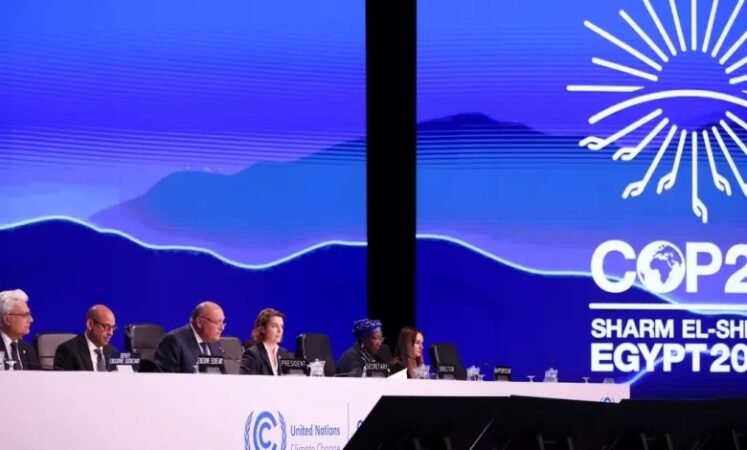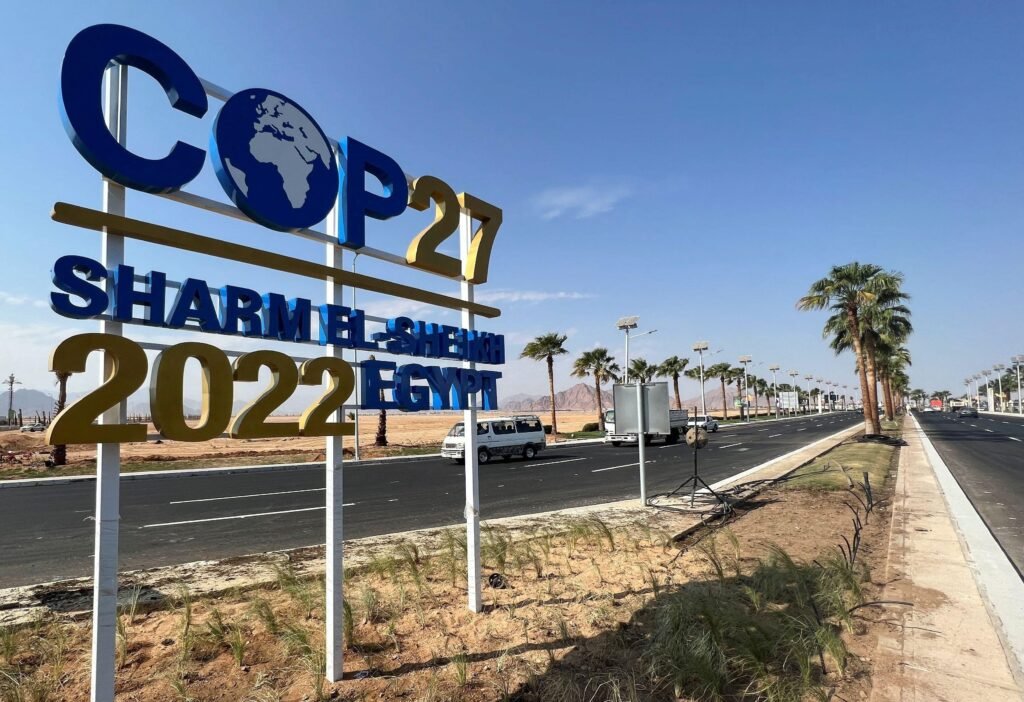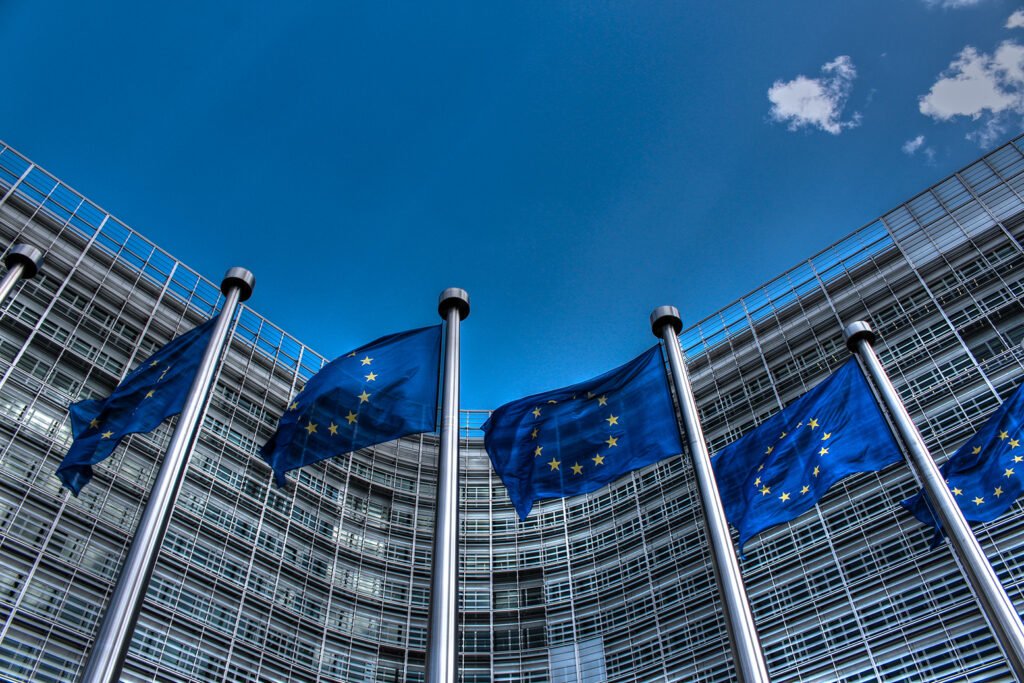Impact of Geopolitics on International Forums: A Case Study of EU’s Actions at COP27

Abstract
The Ukraine-Russia conflict has led to global crises like food security, displacement crisis, loss of human lives and energy security. Amidst this, the European Union (EU) countries are facing the immediate brunt of the war on their economy and energy needs. The conflict has had a deep impact on the EU where the member countries are struggling to meet their daily energy needs. Countries are looking for alternative supply of energy, particularly renewable energy that also keeps them aligned with their global climate change commitments. The brief intends to highlight how the EU’s action at COP27 was a combination of global geopolitics and its strategic interests. At COP27, the EU was seen negotiating a range of bilateral agreements with different countries of the world aimed at diversifying its energy needs away from Russia. Against this backdrop, this article aims to highlight the impact of global geopolitics on the EU’s actions and commitments at COP27.
Introduction
The 27th Conference of the Parties to the United Nations Framework Convention on Climate Change (UNFCCC), commonly known as COP27, was driven by the United Nations Climate Action theme of “Science, Solutions and Solidarity for a livable planet”.[i] The European Union (EU) was deeply engaged in the discussions and negotiations on several issues at COP27, represented by European Council President Charles Michel, European Commission President Ursula von der Leyen and Vice President Frans Timmermans who is also leading the Commission’s work on European Green Deal.[ii]
The 2015 Paris Agreement on climate change committed developed countries to collectively mobilise US$100 billion per year from 2020-2025, to help developing countries in cutting down greenhouse gas emissions and mitigate the consequences of climate change.[iii] Together, the EU and its member states are the biggest contributors of public climate finance to developing economies so far. In 2020 itself, they provided some 23 billion Euros in climate finance (about US$24.6 billion), half of them in the form of grants, which is approximately one-fourth of the global goal of US$100 billion. [iv] This makes the EU a potential global actor when it comes to climate financing and hence their position at global climate conferences, such as the COP, matters. At the same time, it is also important to note that historically, EU countries have contributed around 18 per cent of the total global greenhouse gas emissions.[v] At COP27 in 2022, statements by EU leaders appeared to acknowledge the region’s role in global warming. For instance, European Council President, Charles Michel said, “We built our prosperity partly by overusing fossil fuel resources and by mistreating the natural world. We must therefore shoulder our share of the burden, and we are doing so”[vi].

EU’s Stated Priorities at COP27
At COP27, the EU was clear about its priorities:[vii]
- phasing down coal;
- reducing Methane emissions;
- aligning targets with the 1.5-degree Celsius goal; and
- working on ending inefficient fossil fuel subsidies.
EU’s actions, however, could indicate that its goals remain far-fetched. For instance, even as it stated that it was phasing down coal, the EU has ramped up its coal supplies since July 2022 in a bid to save the region from the energy crisis triggered by the Ukraine-Russia conflict.[viii] While the EU has cut down on its coal imports from Russia, the gap has been filled by other countries such as Australia, South America, Colombia, and South Africa. According to the same report, the imports of thermal coal by the 27-member EU bloc plus the UK will be 43 percent higher in 2023 compared to the past year, “and this will result in an additional 10 million tonnes of CO2 released into the atmosphere.” Additionally, aligning the EU’s targets with the 1.5 degree Celsius goal would require reduced use of all fossil fuels and not only coal.
Meanwhile, the EU also declared that it will prioritise reducing methane emissions, and initiated the Global Methane Pledge along with the United States and other developed countries to help push the world towards the 1.5 degree Celsius goal.[1],[ix] Methane emissions, however, largely emanating from agricultural activities and livestock farming—all crucial sources of livelihood for large populations in developing countries like India.[x] Hence, India is not a signatory to the Methane Pledge.
EU at COP27: Bilateral Agreements
One of the achievements of COP27 was the approval of the ‘Loss and Damage Fund, which aims to provide monetary compensation to countries worst hit by the consequences of climate change. This was a long overdue demand of many developing countries that have had a less historical share in the stock of global greenhouse gas emissions but are disproportionally affected by the impacts of global warming.
Before COP27, the EU was opposed to the idea of the creation of a separate International Fund for climate reparations,[xi] citing existing instruments such as climate finance. Eventually, the EU gave its nod to the Fund, with Timmermans stating that, “The EU had listened to the G77 group of developing countries, for whom the establishment of a fund at this summit is a core demand.”[xii] He articulated the EU’s position that the Loss and Damage Fund should go only to the most vulnerable countries, and not all developing countries[xiii] as proposed by the G77. For their part, the developing countries-led bloc emphasised that the new funding mechanism should be formalised and established under the UNFCCC that offers protection of an equitable climate agreement.[xiv]
On the sidelines of COP27, the EU concluded climate deals with different developing countries. These are outlined in the following paragraphs.
Strategic partnership with Namibia
The EU concluded a partnership with Namibia on sustainable raw materials and renewable hydrogen, with the Memorandum of Understanding (MoU) being signed between EU’s Commission President Ursula von der Leyen and Namibian President Hage Geingob. The same was discussed earlier between the two leaders in February 2022 during the EU-Africa Summit, as part of the EU’s Global Gateway Strategy that aims to mobilise up to 300 billion Euros in investments between 2021-2027 in order to boost smart, clean and secure links in digital, energy and transport and strengthen health, education and research systems across the world.[xv] The EU needs a secure supply of sustainable raw materials which are essential for green and clean energy projects such as wind turbines. Similarly, renewable hydrogen technology supports the decarbonisation of energy-intensive industries.[xvi] Such partnerships are thus based on potential mutual benefits, fostering cooperation towards achieving sustainable climate goals.
MoU on renewable hydrogen with the Arab Republic of Egypt
Commission President Ursula Von der Leyen and Egyptian President Abdel Fattah El-Sisi signed a Memorandum of Understanding (MoU) on renewable hydrogen, intended to serve as a building block for an EU-Mediterranean Renewable Hydrogen Partnership. The MoU is intended to help the EU lower its emissions by replacing hydrogen produced using natural gas, with the direct use of hydrogen as an energy source. The EU currently consumes around 8 million tonnes of hydrogen per year, with 98 per cent of it derived from natural gas.[xvii] From the perspective of energy security, the move is intended to reduce the EU’s dependence on Russian gas against the backdrop of the ongoing Ukraine-Russia crisis. For Egypt, the MoU is expected to facilitate the decarbonisation process and increase investments in renewables.
MoU with Kazakhstan
The EU signed an MoU with Kazakhstan on three areas: (a) closer economic and industrial integration; (b) increasing resilience and enhancing transparency; and (c) capacity building, skills training, and research and innovation.[xviii] The partnership is mutually driven by the EU’s need for securing a sustainable supply of raw materials and Kazakhstan’s need for greater collaboration with Europe on exporting oil through alternative pipeline routes, in the backdrop of the Ukraine-Russia conflict.
Forestry Partnerships
The EU launched partnerships in the forestry sector with Guyana, Mongolia, the Republic of Congo, Uganda, and Zambia. The project aims to combat deforestation “and consequently enhance climate and biodiversity protection.”[xix] The partnerships were signed as part of the external dimension of the EU Green Deal which calls on partner countries to follow a sustainable recovery plan similar to that of the EU. European Green Deal is a set of policy initiatives by the European Commission with the goal of making the European Union climate neutral by 2050. The Green Deals’ external dimensions deal with bilateral and regional partnerships, in addressing climate change through multilateral knowledge cooperation. However, there is yet to be created an integrated approach to the Green Deal, and it remains unclear how partner countries would have to adapt to the EU’s rules, regulations and standards.[xx]

EU’s Foreign Policy Approach
COP27 was much about shifting the focus from COP26 ‘rulebook’ discussion to concrete actions on the ground. The EU’s focus at COP27 on forging greater partnerships with different countries of the world on sustainability and transitioning to renewable energy systems was seen to be driven by multiple factors:
1: Reducing its overall dependence on Russia. For instance, The MoU signed between Egypt and the EU itself could substitute 27 billion cubic metres (bcm) of imported Russian natural gas, 4.7 bcm of imported Russian oil, and 156 kT (thousand tonnes) of coking coal imports[xxi] for the EU.
2: Looking for alternative supply of energy sources to meet its growing energy demands.
3: Fulfilling its global climate commitments in the direction of moving towards green and clean energy.
During the COP27, the EU also consistently held its view that any financing from the Loss and Damage Fund would go only to the most vulnerable countries and would draw upon a wider donor base. The EU’s Timmermans talked about increasing the donor base to include new countries from the developing nation’s cohort along with the other developed countries, citing that some of these developing countries have economically developed over the last few years and should therefore be made part of the donor base. Timmermans strongly raised the need for including China within the pool of contributors as China is one of the fastest-growing economies. “China is one of the biggest economies on the planet with a lot of financial strength. Why should they not be made co-responsible for funding loss and damage?”[xxii] China has so far, at the time of writing, declined to comment on the EU officials’ statements. This, however, has raised red flags among the developing countries who not just fear their inclusion within the ‘donor base’ but also find it contravening to the ‘common but differentiated responsibilities’ clause of the UN Framework Convention on Climate Change and the Paris Agreement that recognises different capabilities and differing responsibilities of individual countries in addressing climate change[xxiii].
Timmermans also announced during COP27 that the EU, along with four member states—i.e., France, Germany, Netherlands and Denmark—will provide a financial package of 1 billion Euros to support adaptation measures in Africa. He said many countries in the continent are among the most vulnerable to climate change and would thus need urgent assistance from the international community.[xxiv] Indeed, adaptation finance is a priority for Africa given the disproportionate impacts of global warming on its populations. However, it has been seen that global climate finance flows are generally directed towards mitigation activities which are associated with market instruments like loans, thereby increasing concerns about the debt sustainability of developing countries who are already experiencing debt distress.[xxv] The EU, therefore, needs to ensure that the fund is carefully used for ‘Adaptation in Africa’ and any future financial package considers Africa’s debt sustainability. The Africa Adaptation Acceleration Program (AAAP) aims to mobilize 25 billion dollars by 2025 to implement, scale and accelerate climate adaptation across the African continent.
Conclusion
The approval of the “Loss and Damage Fund” was a landmark achievement at COP27, however, the EU strongly clarified that this fund would be conditional and subject to a ‘gap analysis’ that would explore specific vulnerabilities of nations and communities to climate change. It remains to be seen how EU takes this forward in the subsequent COPs and climate change negotiations. Further, the EU’s proposal of financing climate change measures through an “expanded donor base” has raised red flags among developing countries, who consider this as contravening to ‘common but differentiated responsibilities” clause of the UNFCCC treaty. EU’s response to the question of ‘who should pay’ for the loss and damage fund has raised concerns about EU’s renewed approach of looking at the ‘developing countries cohort’ and which analysts say, is largely driven by EU’s own geopolitical interests. Having said that, the efforts of the EU and its member states towards supporting vulnerable countries, particularly in Africa, is being looked up with appreciation but needs careful execution, considering the vulnerability and debt-distress situation of many African countries. Lastly, the fast pace of EU’s transition towards renewable energy sources in the backdrop of the Ukraine-Russia conflict, justifies EU’s greater cooperation with the energy rich partners of Asia and Africa, thereby reflecting upon the two-way reciprocity needed amidst changing geopolitics. Moreover, EU’s bilateral agreements signed with different countries at the margins of COP27 may contribute to EU’s global climate change commitments but it also reiterates the fact that the developed world (including the EU) has always kept their national interests supreme while responding to the global challenges. On the other hand, if developing countries prioritise their national interests over geopolitical concerns, they often become victims of criticisms raised by the developed world. Thus, while considering EU’s actions at COP27, it can be safely said that the climate change debate was clearly hijacked by changing geopolitics, with a hope that COP28 would address global climate change concerns and not merely the geopolitical
[1] Methane is the second largest contributor to greenhouse gas emissions, after carbon dioxide.
[i] United Nations (2022), “Climate Action”, https://www.un.org/climatechange?gclid=Cj0KCQiAg_KbBhDLARIsANx7wAyRDHfm5LlV9SX9nAsMwLHid_qsQwBNXtNWylmCoFgol-NJ8SxOm1EaAlN9EALw_wcB
[ii] European Green Deal is a set of policy initiatives by European Commission with the goal of making the European Union climate neutral by 2050. The Green Deals’ external dimensions deal with bilateral and regional partnerships, in addressing climate change through multilateral knowledge cooperation.
[iii] European Commission(2022), “Questions and answers on the Commission’s participation at COP27”, Press Corner, 4 November 2022 https://ec.europa.eu/commission/presscorner/detail/en/qanda_22_6525
[iv] European Commission(2022), “EU at COP27 Climate Change Conference”, https://ec.europa.eu/info/strategy/priorities-2019-2024/european-green-deal/climate-action-and-green-deal/eu-cop27-climate-change-conference_en
[v] Statista (2022), “Emissions in the EU- Statistics and Facts”, 15 August 2022, https://www.statista.com/topics/4958/emissions-in-the-european-union/
[vi] Beyond the Horizon (2022), “COP27, EU Green Deal and the Birth Pain of a new International Order”, 24 November 2022 https://behorizon.org/cop-27-eu-green-deal-and-the-birth-pain-of-a-new-international-order/
[vii] European Commission (2022), “EU at COP27 Climate Change Conference”, https://ec.europa.eu/info/strategy/priorities-2019-2024/european-green-deal/climate-action-and-green-deal/eu-cop27-climate-change-conference_en
[viii] Reuters (2022), “Factbox Europe ramps up coal imports as energy supply fears grow”, 27 July 2022, https://www.reuters.com/business/energy/europe-ramps-up-coal-imports-energy-supply-fears-grow-2022-07-26/
[ix] European Commission (2021), “Launch by United States, the European Union, and partners of the Global Methane Pledge to keep 1.5 degree Celsius within reach”, 2 November 2021, https://ec.europa.eu/commission/presscorner/detail/en/statement_21_5766.
[x] Eco-business (2021), “Why India is neglecting its methane problem?”, 3December 2021, https://www.eco-business.com/news/why-india-is-neglecting-its-methane-problem/
[xi] Euro News (2022), “COP27: Despite growing calls, the EU intends to oppose separate fund for climate reparations”, 7 November 2022. https://www.euronews.com/my-europe/2022/11/04/cop27-despite-growing-calls-the-eu-intends-to-oppose-separate-fund-for-climate-reparations
[xii] The Guardian (2022),“COP27: EU agrees to loss and damage fund to help poor countries amid climate disasters”, 18 November 2022 https://www.theguardian.com/environment/2022/nov/18/cop27-eu-agrees-to-loss-and-damage-fund-to-help-poor-countries-recover-from-climate-disasters
[xiii] Times of India (2022),“COP27: India says no to mandatory contribution to loss and damage finance, EU wants China to pay”, 16 November 2022 https://timesofindia.indiatimes.com/india/cop27-india-says-no-to-mandatory-contribution-to-loss-and-damage-finance-eu-wants-china-to-pay/articleshow/95564831.cms
[xiv] Down to Earth (2022), “COP27 will fail because of the US, EU and Global North, not the developing world”, 19 November 2022 https://www.downtoearth.org.in/news/climate-change/cop27-will-fail-because-of-the-us-eu-and-global-north-not-the-developing-world-86083
[xv] European Commission (2021), “Global Gateway: up to 300 billion Euros for the European Union’s Strategy to boost sustainable links around the world”, Press Release, 1 December 2022. https://ec.europa.eu/commission/presscorner/detail/en/ip_21_6433
[xvi] European Commission (2022), “COP27: European Union concludes a strategic partnership with Namibia on sustainable raw materials and renewable hydrogen”, 8 November 2022. https://ec.europa.eu/commission/presscorner/detail/en/IP_22_6683
[xvii] European Commission (2022), “COP27: EU and Egypt step up cooperation on the clean energy transition”, 16 November 2022. https://ec.europa.eu/commission/presscorner/detail/en/ip_22_6925
[xviii] European Union (2022), “COP27: European Union concludes a strategic partnership with Kazakhstan on raw materials, batteries and renewable hydrogen”, 8 November 2022 https://www.eeas.europa.eu/delegations/kazakhstan/cop27-european-union-concludes-strategic-partnership-kazakhstan-raw-0_en?s=222
[xix] European Commission (2022), “COP27: EU launches Forest partnerships with five partner countries”, 8 November 2022 https://ec.europa.eu/commission/presscorner/detail/en/ip_22_6653
[xx] German Institute of Development and Sustainability (2021), “The external dimension of the European Green Deal: The case for an integrated approach”, Briefing Paper 13/2021, https://www.idos-research.de/en/briefing-paper/article/the-external-dimensions-of-the-european-green-deal-the-case-for-an-integrated-approach/,
[xxi] European Commission (2022), “COP27: EU and Egypt step up cooperation on the clean energy transition”, 16 November 2022 https://ec.europa.eu/commission/presscorner/detail/en/ip_22_6925
[xxii] Climate Home News (2022), “EU opens the door to a loss and damage facility- if China pays”, 16 November 2022 https://www.climatechangenews.com/2022/11/16/frans-timmermans-eu-is-open-to-loss-and-damage-fund/
[xxiii] https://theprint.in/environment/cop27-eu-proposal-on-climate-loss-damage-fund-lacks-moral-integrity-say-developing-countries/1224729/
[xxiv] European Commission (2022), “Remarks by Executive Vice President Timmermans at the Ministerial side event on the Team Europe Initiative on climate change adaptation and resilience in Africa”, Press Corner, 16 November 2022 https://ec.europa.eu/commission/presscorner/detail/en/SPEECH_22_6974
[xxv] World Bank Blogs (2022), “COP27: The African COP and the risk of a global U-turn to the Paris Agreement”, 17 November 2022 https://blogs.worldbank.org/africacan/cop27-african-cop-and-risk-global-u-turn-paris-agreement


















